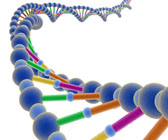Description
Modern biological techniques are generating a variety of large-scale data, and require sophisticated algorithms for their analysis. Tasks include assembling the genomic sequence, predicting the protein-coding regions, their function and the manner in which they are regulated. The course will provide a broad overview of the computational techniques currently used in bioinformatics. Students completing the course will be able to analyze a variety of biological data, a skill they will develop through the hands-on lab component, which will consist of algorithm implementation and biological case studies using those algorithms. Computational techniques covered in the course include dynamic programming for sequence alignment, hidden Markov models for gene finding, and graph algorithms for sequence assembly and motif finding.
Personnel
|
Prerequisites
CS320 is the only prerequisite for this course.
Textbook
(Recommended) Neil C. Jones and Pavel A. Pevzner. An introduction to bioinformatics algorithms. MIT Press, 2004.
Grading
Here are the formally graded elements of the course and associated weighting:
| Activity | Weight |
|---|---|
| Assignments | 25 % |
| Midterm | 25 % |
| Final project | 40 % |
| Quizzes | 10 % |
Late and Makeup Policy
Midterm: Make-up exams are only given in extraordinary circumstances (e.g., illness, family emergency). Students must consult with the instructor as soon as possible. Course examination dates are listed in the syllabus; be aware of them and plan accordingly.
Projects: Unless otherwise specified, programming assignments are to be submitted electronically. Specifics will be included in each assignment. Always check the assignment page for due dates. Late assignments submitted within 48 hours of the time required will receive a 10% late penalty. Students not having submitted programs receive an automatic zero on the assignment.
Important Dates
| Midterm | March 10, 2020 |
| W day | March 23, 2020 |
The midterm will be held in the same classroom as regular lectures. While no change to the midterm date is anticipated, the instructor reserves the right to change these dates with a week's notice.
Professional Conduct
All students are expected to conduct themselves professionally. We (the instructors and GTAs) assume you are familiar with the policies in the student information sheet for the department. Additionally, you are computing professionals, albeit perhaps just starting. You should be familiar with the code of conduct for the primary professional society, ACM. You can read the ACM Code of Conduct HERE.
We work to maintain an environment supportive of learning in the classroom and laboratory. Towards that end, we require that you be courteous to and respectful of your fellow participants (i.e., classmates, instructors, GTAs and any tutors). In particular:
- Please turn off the ring on your cell phone. If you are expecting an emergency call, sit near the door and slide out discretely to take it.
- In class use of electronic devices in general, and laptops specifically, is permitted as a courtesy so that you may better participate and learn. If at any time the instructor judges that an electronic device is becoming a distraction the student may be asked to to turn it off and put it away.
- All exams and quizzes are to be done without the aid of notes of any kind. Laptops and all other electronic devices must be shut and put away during exams and quizzes.

